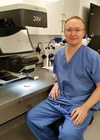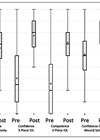Ethical and practical barriers hinder early surgical experience in ophthalmology training [1], which is problematic when early-career trainees bring a higher risk of poor surgical outcomes and patient harm [2]. The European working time directive and the surgical backlog secondary to Covid-19 has exacerbated the strain placed on theatre space [3]. To alleviate this strain, simple NHS cataracts suitable for training are contracted out to the private sector, leaving more complex operations to NHS training hospitals [4].
This increased theatre pressure combined with more difficult cases has resulted in reduced training opportunities for early-career ophthalmologists. This may explain why in a survey of 113 trainees, 72% reported an inability to meet their training requirements from February 2020 to August 2020 [5]. Similarly, the 2022 National Training Survey found that 30% of ophthalmology trainees are not on course to gain enough experience in practical procedures needed for their stage of training [6]. Although the Royal College of Ophthalmologists are taking steps to increase training opportunities in the private sector [7], simulation training may allow trainees to utilise more opportunities in the public sector.

Simulation has been recognised by the Royal College of Ophthalmologists as essential to training [5]. Historically, simulation utilised wet lab models such as pig eyes and has expanded to include inanimate objects such as plastic models, grapes, and tomatoes [8,9]. Emergently, virtual reality (VR) has taken centre stage in ophthalmic training programmes [8].
Among trainees, there exists a lack of appreciation for simulation, which poses a barrier to engagement [10,11]. Trainees may express concerns about the transferability of VR experiences to the operating theatre [10]. While it is true that certain simulators, such as the MicroVisTouch simulator, have shown a weak correlation between simulator experience and surgical outcomes [12], this is not the case for all ophthalmology simulators. Several studies analysing the EyeSi simulator have demonstrated a close relationship between simulation success and operational success [13]. Moreover, a Cochrane review conducted in 2021 yielded significant findings regarding the benefits of VR training for ophthalmology trainees [14]. Those who received supplementary simulation training in VR demonstrated fewer intra-operative complications, shorter operating times, and received higher ratings from their supervisors compared to those without such training. However, it is important to note that the review was based on a limited pool of six studies, all of which had a low or very low certainty of evidence and exhibited a high risk of bias. Interestingly, the review did not find any discernible difference between wet lab simulation and VR simulation [14].
"Simulation has been recognised by the Royal College of Ophthalmologists as essential to training"
Simulation training isn’t limited to early-career ophthalmologists. A survey of ophthalmologists identified a need for increased preparedness in managing complications before entering operations [15], highlighting a potential role for simulation training in the more experienced trainee. In a 2022 survey of 70 senior registrars, 50% did not feel confident in independently managing posterior capsule ruptures, a common complication of cataract surgery [15]. Simulation training has been shown to result in a statistically significant improvement in the management of posterior capsule ruptures [16]. Lack of access to simulation training was identified as a key barrier to their confidence [15].
Simulation training offers benefits beyond technical skills. Complication rates associated with non-technical skills, such as communication, decision-making, and situational awareness are significant [17]. Poor communication has been found to contribute to inappropriate lens insertion during cataract operations [18]. Simulated scenarios have been created to enhance non-technical skills training. These scenarios include tasks like proper marking of the surgical site, utilisation of the appropriate intraocular lens formula, and accurate patient identification [19].
Despite these promising outcomes, the adoption of VR simulation in surgical training comes with substantial cost implications. Consequently, the accessibility of these simulators is hampered, as they are predominantly located regionally. Despite this barrier, the Royal College of Ophthalmologists recognises the value of VR training and requires all ophthalmologists to undergo simulation training in phacoemulsification before performing cataract operations.
In conclusion, suitable ophthalmic simulation provides an effective means for trainees to supplement their theatre experience, enhancing both technical and non-technical skills.
References
1. Reznick RK, MacRae H. Teaching surgical skills—changes in the wind. New Eng J Med 2006;355(25):2664–9.
2. Gallagher AG, Traynor O. Simulation in surgery: opportunity or threat? Ir J Med Sci 2008;177(4):283–7.
3. Campbell S, Hind J, Lockington D. Engagement with ophthalmic simulation training has increased following COVID-19 disruption—the educational culture change required? Eye (Lond) 2021;35(10):2660–1.
4. Outsourced: the role of the independent sector in the NHS (2022). British Medical Association.
https://www.bma.org.uk/media/5378/
bma-nhs-outsourcing-report-march-2022.pdf
5. Chiu A, Low L, Spencer F. Mitigating the impact of COVID-19 on Ophthalmology Training (2020). Royal College of Ophthalmologists.
https://www.rcophth.ac.uk/wp-content/uploads/
2020/11/Mitigating-Effects-Of-COVID-19
-Ophthalmologists-In-Training_Nov2020.pdf
6. National training survey 2022 results. General Medical Council.
https://www.gmc-uk.org/-/media/documents/
national-training-survey-summary-report
-2022-final_pdf-91826501.pdf
7. Blueprint for cataract training in the independent sector: guidance for providers and trainers (2022). Royal College of Ophthalmologists.
https://www.rcophth.ac.uk/wp-content/
uploads/2022/10/Blueprint-for-cataract
-training-2022_v2.pdf
8. Spencer F. Surgical Skills Simulation for the curriculum (2014). Simulation Group of Education Committee.
https://www.rcophth.ac.uk/wp-content/
uploads/2021/01/Surgical-Skills-Simulation-for
-the-curriculum-Fiona-Spencer-July-2015.pdf
9. Zhang Z, Li S, Sun L, et al. Skills assessment after a grape-based microsurgical course for ophthalmology residents: Randomised controlled trial. Br J Ophthalmol 2023;107(9):1395–402.
10. la Cour M, Thomsen ASS, Alberti M, Konge L. Simulators in the training of surgeons: is it worth the investment in money and time? 2018 Jules Gonin lecture of the Retina Research Foundation. Graefes Arch Clin Exp Ophthalmol 2019;257(5):877–81.
11. Lockington D, Saleh GM, Spencer AF, Ferris J. Cost and time resourcing for ophthalmic simulation in the UK: a Royal College of Ophthalmologists’ National Survey of regional Simulation Leads in 2021. Eye (Lond) 2022;36(10):1973–6.
12. Sikder S, Luo J, Banerjee PP, et al. The use of a virtual reality surgical simulator for cataract surgical skill assessment with 6 months of intervening operating room experience. Clin Ophthalmol 2015;9:141.
13. Ferris JD, Donachie PH, Johnston RL, et al. Royal College of Ophthalmologists’ National Ophthalmology Database study of cataract surgery: report 6. The impact of EyeSi virtual reality training on complications rates of cataract surgery performed by first and second year trainees. Br J Ophthalmol 2020;104(3):324–9.
14. Lin JC, Yu Z, Scott IU, Greenberg PB. Virtual reality training for cataract surgery operating performance in ophthalmology trainees. Cochrane Database Syst Rev 2021;12(12):CD014953.
15. Swampillai AJ, Nowak VA, Maubon L, et al. Confidence of UK Ophthalmology Registrars in Managing Posterior Capsular Rupture: Results from a National Trainee Survey. Ophthalmol Ther 2022 Feb;11(1):225–37.
16. Wood TC, Maqsood S, Sancha W, et al. Principles of simulation and their role in enhancing cataract surgery training. Eye (Lond) 2022;36(8):1529–31.
17. de Leval MR, Carthey J, Wright DJ, et al. Human factors and cardiac surgery: a multicenter study. J Thorac Cardiovasc Surg 2000;119(4):661–72.
18. Simon JW, Ngo Y, Khan S, Strogatz D. Surgical confusions in ophthalmology. Arch Ophthalmol 2007;125(11):1515–22.
19. Saleh GM, Wawrzynski JR, Saha K, et al. Feasibility of human factors immersive simulation training in ophthalmology the London pilot. JAMA Ophthalmol 2016;134(8):905–11.
[All links last accessed January 2024]
Declaration of competing interests: None declared.












